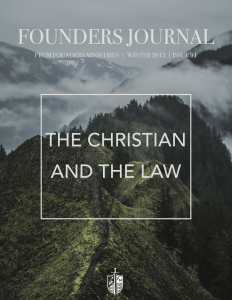Why I Sabbath on Sunday
Sometimes parents lead their children by command. Other times, they lead by example. The same is true of our heavenly Father. In some cases, God explicitly tells us what to do. In other cases, He acts and expects us to follow His example. In the Decalogue, God commands His people to rest from their weekly labors one day a week. Moreover, the Lord grounds this command in His own example:
For in six days the LORD made heaven and earth, the sea, and all that is in them, and rested on the seventh day. Therefore the LORD blessed the Sabbath day and made it holy (Exodus 20:11, ESV).
So Israel should set the “Sabbath day” apart because God Himself set it apart. They are responsible in this case to follow their Maker’s example.
Christ also roots the Sabbath obligation in creation and underscores its beneficent aim: “The Sabbath was made for man, not man for the Sabbath” (Mark 2:27). God didn’t rest on the seventh day merely for His own benefit. He did it for mankind (ανθροπος). This implies that the Sabbath was first instituted at creation, not Sinai. What’s more, the Sabbath wasn’t instituted solely for Israel’s benefit. It was made for humanity.1
God’s Enthronement
Is there a theological rationale for the Sabbath as it applies to God and to man? Elsewhere, the Bible links “Sabbath-rest” with kingly enthronement (cf. 1 Chronicles 28:2; Psalm 132:7-8, 13-14; Isaiah 66:1).2 Accordingly, we may view God’s six days of creative activity as divine empire building. On the seventh, the Creator-King assumed His throne.3
How does this apply to the human observance of Sabbath-rest? The Bible says God created man in His “image.” In its biblical and ancient Near Eastern context, the concept of divine image denoted the idea of a visible replica and vice regent of the deity.4 Hence, God creates man in His image in order to fill the earth (with visible replicas of Him) and to subdue the earth, as vice regent, bringing the created order to its consummation. The implied goal, which in later revelation is explicitly revealed, is that man will assume his place at God’s right hand and enjoy eternal Sabbath-rest (cf. Hebrews 4:1-11). Until the consummation, then, the weekly Sabbath day serves as a commemoration of God’s creative work and royal rest. It also serves as a reminder the rest that awaits us in the age to come.
But if our Creator worked the first six days of the week and rested on the seventh, why do we, as Christians, celebrate our “Sabbath” on the first day of the week? Why do we worship on Sunday instead of Saturday? Granted, the apostolic church met for worship on Sunday (Acts 20:7; 1 Corinthians 16:1-2).5 But is there any theological rationale for this practice?
Jesus’ Enthronement
Early Christians justified Sunday worship on the basis of Christ’s resurrection. This makes perfect sense since Jesus’ resurrection is His enthronement (compare Psalm 2:6-7 with Acts 13:33; see also Philippians 2:5-11). Because divine enthronement is linked with Sabbath-rest, Christians are justified in keeping Sunday as a Sabbath on the basis of Christ’s example. In other words, just as God’s example of resting on the seventh day was sufficient warrant for man to follow his Maker’s example, so Jesus’ example of resting on the first day is sufficient warrant for the new humanity to follow its Re-Maker’s example.
So I don’t need a direct New Testament command to keep Sunday holy. I have Jesus’ example to follow.6 Keeping a first-day Sabbath allows me to declare to the world at large that Jesus, as the first-fruits from the dead (1 Corinthians 15:20, 23a), has already set into effect the New Creation (2 Corinthians 5:17). It also reminds me on a weekly basis that my labor in the Lord is not in vain–the day’s coming when I’ll be raised with Christ to rule and reign with Him forever (1 Corinthians 15:23b, 51-58; cf. 1 Corinthians 6:3; Revelation 5:10; 22:5).\
1 I’m aware of scholars who deny that Jesus’ use of ανθροπος expands the scope of Sabbath observance beyond Israel to humanity and who deny, therefore, Jesus is alluding to the Sabbath’s institution at creation. In support of the idea that the Sabbath was originally instituted at Sinai not creation, these scholars often cite passages like Ezekiel 20:10-12 and Nehemiah 9:13-14. The first reads, “So I led them out of the land of Egypt and brought them into the wilderness. I gave them my statutes and made known to them my rules, by which, if a person does them, he shall live. Moreover, I gave them my Sabbaths, as a sign between me and them, that they might know that I am the LORD who sanctifies them” (emphasis added). The language of the second is similar: “You came down on Mount Sinai and spoke with them from heaven and gave them right rules and true laws, good statutes and commandments, and you made known to them your holy Sabbath and commanded them commandments and statutes and a law by Moses your servant” (emphasis added). By way of response, three observations are in order: (1) the verbs “make known” and “gave” are used synonymously in both texts. (2) Not only the Sabbath but God’s “statutes,” “rules,” “commandments,” and “law” were made known and given at Sinai. So whatever one concludes about the origination of the Sabbath based on the language of “make known” or “give,” he’s obliged to say of the other ethical norms God revealed on Sinai. (3) To “make known” or “give” a norm or stipulation doesn’t necessarily imply that said norm or stipulation wasn’t already previously instituted or binding. Moses portrays primeval and patriarchal history in a way that assumes humans generally and the patriarchs especially were aware of the kind of divinely revealed moral norms we find in the Decalogue (see, for instance, Genesis 4:14; 9:23-25; 18:19; 20:9; 26:5, 10; 39:9; 42:22; 50:17). While humans would have had a general awareness of God’s moral law by means of conscience, it’s also likely that God had revealed to certain individuals laws and stipulations that reflected His moral character and by which He expected them to live (Genesis 4:9-13; 9:5-6; 18:19; 26:5). (4) When God tells Moses in Exodus 6:3, “I appeared to Abraham, to Isaac, and to Jacob, as God Almighty, but by my name the LORD I did not make myself known to them” (emphasis added), He isn’t saying the Patriarchs or primeval saints were unaware of His name Yahweh (see Genesis 4:26; 12:8; 13:4; 16:13; 21:33; 22:14; 26:25; 29:32, 33, 35; 30:24). Rather, He’s signifying that He will now cause the Israelites to understand more fully the significance of that name. Similarly, one might interpret the references to God’s “making known” His laws and, in particular, the Sabbath, at Sinai. It wasn’t the first revelation of the Sabbath obligation. But it was a point in redemptive history when God would reveal more fully the significance of that ordinance. (5) It’s possible that the Israelites had either neglected Sabbath observance or were forbidden it during their time of bondage in Egypt. In that case, the exodus occasioned the reestablishment of its practice before Sinai (Exodus 16) and its covenantal codification at Sinai (Exodus 20:8-11).
2 Meredith Kline remarks, “To predicate an enthronement of God on the seventh day of creation history is not to deny that the creative activity of God is from the beginning an exercise of an ultimate and absolute sovereignty which he enjoys as an original and everlasting prerogative of his very godhead. It is simply saying that creation produced a new theater for the manifestation of God’s eternal majesty, and when the heavenly throne and earthly footstool had been prepared, God assumed his rightful royal place in that new sphere.” Kingdom Prologue: Genesis Foundations for a Covenantal Worldview (Eugene, OR: Wipf & Stock Publishers, 2006), 37. The reader is encouraged to read the entire section where Kline develops the Sabbath-enthronement link (34-38).
3 I develop the “kingdom” motif of the creation week/Sabbath in my article, “The Covenantal Context of the Fall: Did God Make a Primeval Covenant with Adam?” Reformed Baptist Theological Review 4:2 (2007): 17-30.
4 See my article “Man–God’s Visible Replica and Vice-Regent,” Reformed Baptist Theological Review 5:2 (2008): 63-87.
5 John’s reference to “the Lord’s Day” in Revelation 1:10 is probably a reference to the first day of the week. This is supported by the fact that the adjective when predicated of a day had already obtained this meaning by the latter first century and early part of the second century AD.
6 Many Christians today do not tie a Sabbath-theology to Sunday but worship on the first day of the week simply because of early church precedent or because of cultural convention. They often point out that there’s no explicit command in the NT to observe Sunday as a Sabbath day. Moreover, they cite certain texts (i.e., Romans 14:5-6; Galatians 4:8-11; Colossians 2:11-17), which at first glance seem to discount an ongoing weekly Sabbath. I’ve already demonstrated that a direct command is not needed for Sabbath-observance. Moreover, I’m inclined to view the so-called problem passages as abolishing the Jewish calendar with its seventh-day Sabbath but not necessarily overruling a first day Sabbath, i.e., “the Lord’s Day.” For those interested in reading both sides of the debate, see R. T. Beckwith and W. Stott, This Is the Day: The Biblical Doctrine of the Christian Sunday in Its Jewish and Early Christian Setting (London: Marshall, Morgan and Scott, 1978), as well as John Frame, The Doctrine of the Christian Life (Phillipsburg, NJ: Presbyterian & Reformed, 2008), 513-74, for my position, and D. A. Carson, ed. From Sabbath to Lord’s Day: A Biblical, Historical and Theological Investigation (Grand Rapids: MI: Zondervan, 1982) for the non-Sabbatarian position.




























